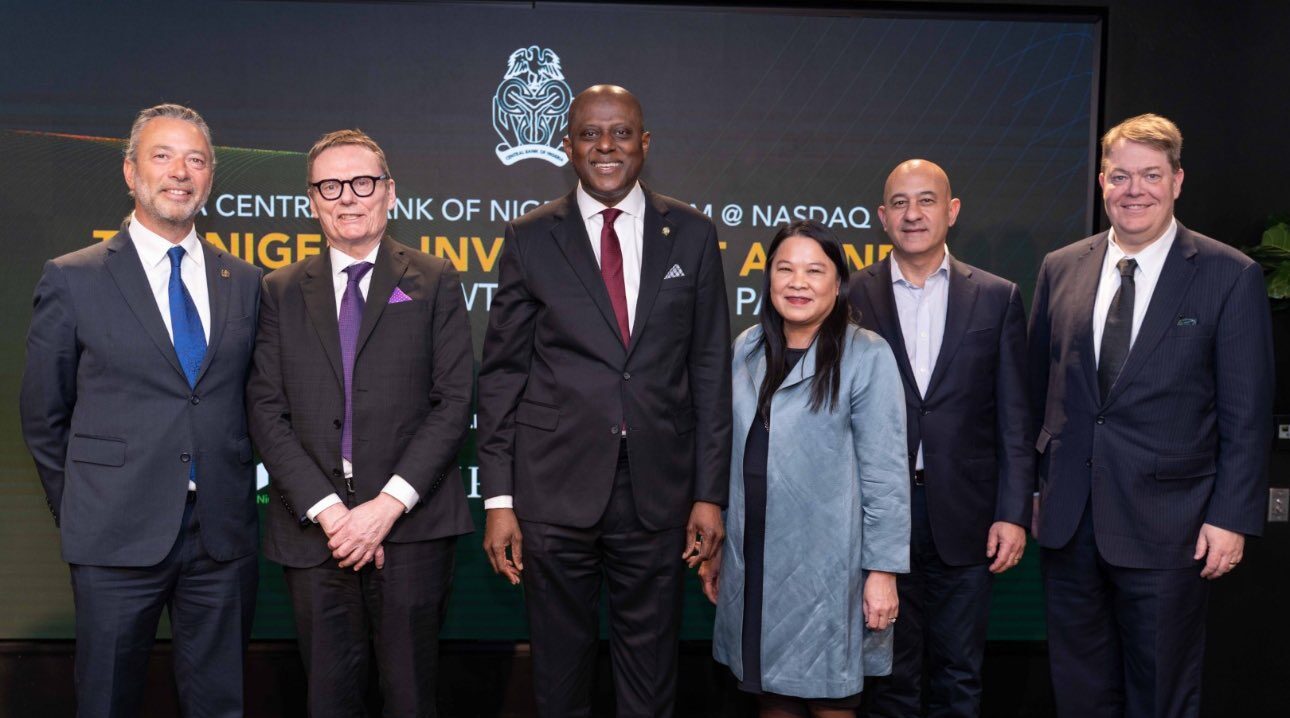Quick Summary:
- CBN hosted a private investor forum at Nasdaq in New York
- Investors welcomed Nigeria’s FX and subsidy reforms
- Concerns raised over oil price volatility, capital repatriation, and high transaction costs
- FX reforms improved sentiment, but global risks persist
- Investors called for consistent policy, lower costs, and better market structure
- Nigeria’s long-term growth potential remains attractive
Foreign investors have welcomed Nigeria’s recent economic reforms. However, they still have concerns. These include oil price volatility, capital repatriation risks, and high transaction costs.
These issues were raised at a private investor forum hosted by the Central Bank of Nigeria (CBN) on April 17, 2025. The event took place at the Nasdaq MarketSite in New York.
Forum Theme: Nigeria’s Investment Agenda
Themed “The Nigeria Investment Agenda: Pathways for Growth & Global Partnerships,” the forum was held in partnership with NGX Group, J.P. Morgan, and AVCA.
Attendees included top global institutions like Citi, JPMorgan Chase, Standard Chartered, and Jadara Capital Partners.
Reforms Recognized, But Risks Remain
While investors acknowledged Nigeria’s reform efforts, they stressed that long-term confidence depends on managing major risks—especially oil market instability.
Praise for Progress
Joyce Chang, Chair of Global Research at JPMorgan Chase, praised Nigeria’s recent reforms. These include the removal of fuel subsidies and foreign exchange (FX) liberalisation.
However, she warned that external pressures are growing. New U.S. tariffs and recession fears could hit emerging markets hard.
“We’re now dealing with a potential 3% of GDP tax effect from recent U.S. tariffs,” Chang said. “Oil price volatility remains a key risk.”
JPMorgan now sees a 60% chance of a U.S. recession, up from 40%.
Oil prices could fall into the $50 range by 2026. That, Chang said, could hurt Nigeria’s economy and investor sentiment.
Beyond Oil: The Push for Diversification
Not all investors focused on oil. Razia Khan, Chief Economist for Africa and the Middle East at Standard Chartered, said Nigeria is in a position to reduce its oil dependence.
“Nigeria might finally break free from the oil cycle,” Khan said. “The FX reforms offer a real path toward sustainable growth.”
She noted that repatriation concerns are easing and called for consistent reform implementation.
“Structural change takes time,” she added. “This is just the beginning.”
FX Reforms Bring Renewed Interest
Jason Rekate, Global Co-Head of Corporate Banking at Citi, said investor interest in Nigeria is rebounding.
“It’s a different conversation now,” he said. “Nigeria is no longer in the ‘penalty box.’”
Rekate credited FX reforms for this change. But he warned that a global downturn could still test the system.
Calls for Lower Transaction Costs
Ahmad Zuaiter, Co-Founder of Jadara Capital Partners, welcomed the changes but flagged lingering challenges in Nigeria’s capital markets.
“Two years ago, foreign portfolio activity was nearly zero. Now there’s interest—but the costs are too high,” he said.
He cited transaction costs of 2–3% for Nigerian equities. In contrast, Saudi Arabia and Egypt average just 0.10–0.15%.
Zuaiter urged regulators to offer stronger assurances on market stability and end practices like frequent FX restrictions.
Long-Term Potential Still Strong
Despite near-term risks, investors still see Nigeria as a promising frontier market.
Khan from Standard Chartered pointed to Nigeria’s growing population and its recent census as key growth signals.
“Nigeria could become the world’s third most populous country by 2050,” she said. “Many investors aren’t positioned for that scale.”
Joyce Chang added that Nigeria is becoming more visible in emerging market portfolios.
“We had Nigeria as a top pick for 18 months,” she noted. “The shift is real, even if challenges remain.”
What Investors Want from CBN
Throughout the forum, investors shared clear expectations from Nigerian authorities. These include:
- Stable FX policy without market shutdowns or arbitrary restrictions
- Lower transaction costs in capital markets
- Clear non-oil revenue policies, such as VAT and tax reforms
- Easier business environment, including infrastructure and travel access
- More transparency in monetary and fiscal communications
Background: Nigeria’s FX Reform Journey
Nigeria’s FX reform drive began in June 2023, after President Bola Tinubu took office.
The CBN unified multiple exchange rates and removed restrictions. This shift allowed demand and supply to guide FX rates.
After initial volatility, the naira stabilized in early 2025. Investor confidence improved, and FX inflows increased.
In April 2025, however, pressure returned. New U.S. tariffs and falling oil prices triggered global uncertainty.
The CBN responded by injecting liquidity and updating its external reserves. Net reserves now stand at $23 billion.
These developments set the stage for the Nasdaq investor forum. There, global investors sought clarity on Nigeria’s economic direction and the sustainability of its FX framework.



















Leave a Reply